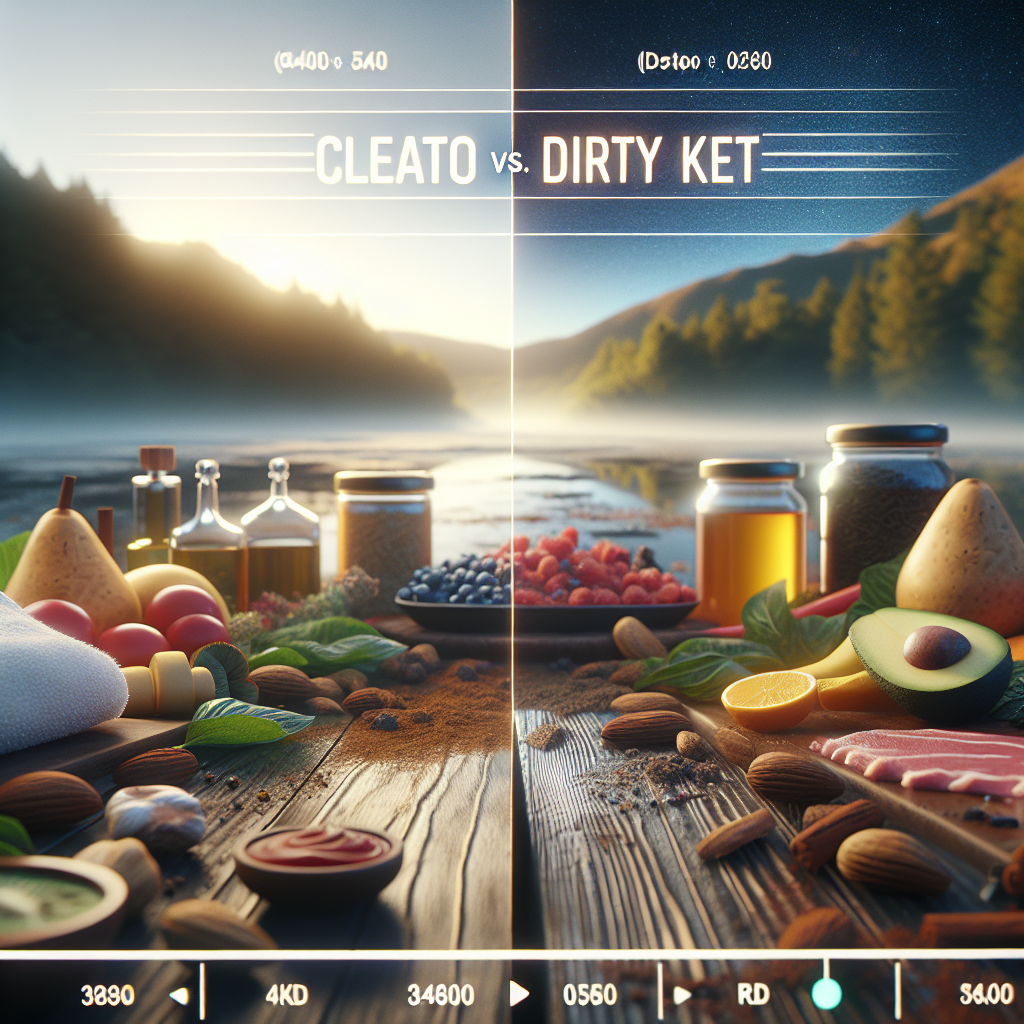
-
Table of Contents
Guide to Clean Keto vs. Dirty Keto

The ketogenic diet, popularly known as the keto diet, has gained significant attention in recent years due to its potential benefits for weight loss, diabetes management, and even neurological health. However, as with any diet, there are different approaches to implementing the keto diet. Two of the most common are “clean keto” and “dirty keto.” This article will delve into the differences between these two approaches, their pros and cons, and how to choose the right one for you.
Understanding the Keto Diet
Before we delve into the specifics of clean and dirty keto, it’s essential to understand the basics of the ketogenic diet. The keto diet is a low-carb, high-fat diet that aims to shift your body’s metabolism from burning glucose (sugar) for energy to burning ketones, which are compounds your body produces when it breaks down fat for energy. This metabolic state is known as ketosis.
The standard ketogenic diet typically involves consuming 70-75% of your daily calories from fat, 20-25% from protein, and only 5-10% from carbohydrates. This drastic reduction in carbohydrate intake forces your body to become efficient at burning fat for energy and leads to weight loss in many individuals.
However, not all keto diets are created equal. The quality of the foods you consume plays a significant role in your overall health and the effectiveness of the diet. This is where the concepts of clean keto and dirty keto come into play.
What is Clean Keto?
Clean keto, also known as strict or healthy keto, focuses on consuming whole, nutrient-dense foods. It emphasizes healthy fats from sources like avocados, olive oil, and fatty fish, along with high-quality proteins and low-carb vegetables. Processed foods, refined sugars, and unhealthy fats are avoided.
Here’s what a typical day on a clean keto diet might look like:
- Breakfast: Avocado and eggs cooked in olive oil
- Lunch: Grilled salmon with a side of leafy green vegetables
- Dinner: Grass-fed steak with a side of broccoli
- Snacks: Nuts, seeds, or a piece of cheese
While the clean keto diet requires more effort in terms of meal planning and preparation, it offers several benefits. It promotes overall health, reduces inflammation, and provides a wide range of nutrients. Moreover, it encourages a healthier relationship with food by emphasizing quality over quantity.
What is Dirty Keto?
Dirty keto, on the other hand, focuses solely on macronutrient distribution – that is, the ratio of fats, proteins, and carbs – without considering the quality of the foods consumed. As long as the food fits within the macronutrient ratios, it’s considered acceptable on a dirty keto diet. This means that processed foods, fast foods, and artificial sweeteners, which are typically avoided on a clean keto diet, can be consumed on a dirty keto diet.
A typical day on a dirty keto diet might include:
- Breakfast: Bacon and eggs
- Lunch: Fast-food burger without the bun
- Dinner: Hot dogs with a side of low-carb vegetables
- Snacks: Pork rinds or low-carb protein bars
While the dirty keto diet may be easier to follow due to its flexibility, it can lead to nutrient deficiencies and long-term health problems if not balanced with nutrient-dense foods. It’s also worth noting that while you may lose weight on a dirty keto diet, the quality of the weight loss may not be as good as on a clean keto diet, as you may lose more muscle mass and less fat.
Comparing Clean Keto and Dirty Keto
Both clean and dirty keto can lead to weight loss and the benefits associated with ketosis, such as improved blood sugar control and increased mental clarity. However, the two approaches differ significantly in terms of their potential impact on long-term health.
Clean keto, with its emphasis on whole, nutrient-dense foods, promotes overall health and can help prevent chronic diseases. It provides a wide range of nutrients, including vitamins, minerals, and antioxidants, and promotes a healthy gut microbiome. Moreover, it encourages mindful eating and a healthier relationship with food.
Dirty keto, on the other hand, can lead to nutrient deficiencies and may increase the risk of chronic diseases due to its high content of processed foods and unhealthy fats. It may also promote unhealthy eating habits, such as over-reliance on convenience foods and neglect of food quality.
Choosing the Right Approach for You
Choosing between clean and dirty keto ultimately depends on your individual goals, lifestyle, and health status. If your primary goal is weight loss and you struggle with strict dietary rules, dirty keto may be a good starting point. However, it’s essential to incorporate nutrient-dense foods into your diet and not rely solely on processed foods.
If you’re looking for a more holistic approach to health and are willing to put in the effort to plan and prepare meals, clean keto may be a better fit. It promotes overall health, reduces inflammation, and provides a wide range of nutrients.
Regardless of the approach you choose, it’s crucial to listen to your body and adjust your diet as needed. It’s also recommended to consult with a healthcare professional or a registered dietitian before starting any new diet plan, especially if you have any underlying health conditions.
Conclusion
In conclusion, both clean and dirty keto can lead to weight loss and the benefits associated with ketosis. However, they differ significantly in terms of their potential impact on long-term health. Clean keto, with its emphasis on whole, nutrient-dense foods, promotes overall health and can help prevent chronic diseases. Dirty keto, on the other hand, can lead to nutrient deficiencies and may increase the risk of chronic diseases due to its high content of processed foods and unhealthy fats.
Choosing between clean and dirty keto ultimately depends on your individual goals, lifestyle, and health status. Regardless of the approach you choose, it’s crucial to listen to your body and adjust your diet as needed. And remember, it’s always recommended to consult with a healthcare professional before starting any new diet plan.